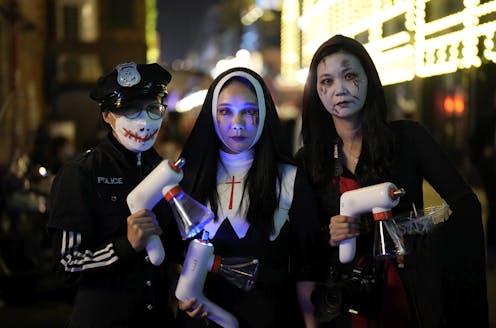Halloween without kids and Christmas without Christ take hold in Asia, with uniquely local twists
- Written by Linus Owens, Associate Professor of Sociology, Middlebury

Halloween is supposed to be fun, a night to put on costumes and publicly celebrate with friends and strangers. Its traditional past as a festival for the dead lives on mainly in spooky decorations and scary movies.
But Halloween horror became all too real this year when a sudden stampede swept through the crowds celebrating the festivities in the trendy neighborhood[1] of Itaewon in Seoul, South Korea, leaving more than 150 people dead[2] and nearly as many injured.
Virtually nonexistent in Korea a decade ago, Halloween’s popularity has grown[3] in recent years. In Itaewon, the holiday brings a large foreign-born population together with young, educated, culturally savvy locals, many of whom have spent time abroad. Rather than being a holiday for kids, Halloween in Korea is celebrated primarily by young adults, who enjoy it as a night on the town.
As a scholar who researches Halloween and young adults[4], I am not surprised by the festival’s popularity in Korea. In a globalizing world, fueled by social media, holidays cross borders, sometimes ending up in very unlikely places.
Crossing borders
Halloween has a long history of globe-trotting. Despite the holiday’s being seen as American, its true origins go back to the Celtic festival of Samhain[5]. When Irish immigrants brought Halloween to America in the mid-19th century, many of their new neighbors initially viewed the mix of ancient rituals and Catholic practices as “un-American.”
With time, however, Halloween gained acceptance, becoming a popular American tradition. But the holiday lost much of its religious and supernatural significance in becoming palatable to a larger population. Mass-produced costumes replaced simple homemade ones, and the range of options exploded from just ghosts and goblins to include favorite characters from movies and television.
This commercialized version of the holiday has continued to expand into the rest of the world. In Korea and Japan, it is most enthusiastically embraced by young adults. Halloween came to Japan via American pop culture in the late 20th century and has exploded in popularity in recent years[6]. Neither a religious festival nor a children’s holiday, Halloween in Japan is a time for adults to dress in creative costumes and go to parties. It is now the second-largest consumer holiday in Japan after Christmas.
Despite Christians being only a small minority in Japan, Christmas thrives[7] as an entirely secular holiday, without nativity scenes, but symbolized by reindeer, snowmen and Christmas trees. Like Halloween, Christmas came to Japan through the media and multinational corporations seeking to profit from holiday spending.
Travel and transformation
At first glance, this may looks like a perfect example of globalization – of Western commercialism finding new audiences for meaningful traditions. A closer look reveals a more complex picture.
Commercialization pulls holidays from their roots, allowing them to travel the globe. When they land, however, locals transform them into something that works for them. Globalization is met with localization, a process researchers call “glocalization[8].”
Whatever its origins, Christmas in Japan is distinctly Japanese[9]. It complements traditional December gift-giving traditions, as well as drawing on existing cultural norms for how to wrap and present gifts. Additionally, the Japanese have created their own traditions related to the holiday. They celebrate with elaborate and expensive Christmas cakes. For them, Christmas is more like Valentine’s Day, with the focus on romance rather than the family, as it is in the West. Additionally, they celebrate the day on the 24th. By the next day, the Japanese are already putting away their decorations.
Japanese Halloween also has its own unique characteristics[10]. For example, Japanese costumes are informed by local cultural traditions, both traditional folklore and contemporary pop culture cosplay.
Global holidays are not always welcomed in new contexts. Although many in the West now view Christmas[12] and Valentine’s Day[13] as fully secularized and commercial holidays, their historical ties to Christianity can spark strong resistance from religious groups in countries outside the U.S. In India, Hindu conservatives have been opposing the celebration of Christmas.
In Pakistan, religious groups have pushed back against Valentine’s Day celebrations. Some have also rejected it for the crass commodification of love[14].
Cultural exchanges
Increasingly, global culture flows in multiple directions. The same night that Koreans dressed up like Americans for Halloween, many Americans put on costumes of their favorite characters from the hit show “Squid Game[15],” a Korean program that has gained widespread popularity in the U.S.
Often holidays travel most smoothly when reduced to primarily commercial expressions, freed from religious beliefs and national context. After all, one doesn’t need to believe in ghosts to wear a Halloween costume, or in Jesus to buy a Christmas gift.
References
- ^ trendy neighborhood (www.nytimes.com)
- ^ leaving more than 150 people dead (www.nytimes.com)
- ^ Halloween’s popularity has grown (www.npr.org)
- ^ Halloween and young adults (theconversation.com)
- ^ true origins go back to the Celtic festival of Samhain (theconversation.com)
- ^ has exploded in popularity in recent years (doi.org)
- ^ Christmas thrives (doi.org)
- ^ glocalization (doi.org)
- ^ distinctly Japanese (doi.org)
- ^ unique characteristics (doi.org)
- ^ Yoshikazu Tsuno/Pool Photo via AP (newsroom.ap.org)
- ^ Christmas (www.nytimes.com)
- ^ Valentine’s Day (www.washingtonpost.com)
- ^ crass commodification of love (thesocietypages.org)
- ^ Squid Game (variety.com)
Authors: Linus Owens, Associate Professor of Sociology, Middlebury

